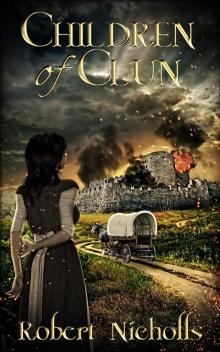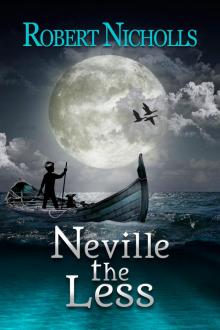- Home
- Robert Nicholls
Children of Clun Page 6
Children of Clun Read online
Page 6
Wild Jack gaped, still slightly vague from the blow he’d suffered. Roger Ringworm clutched his collection of charms and allowed his single tooth to tremble on his lower lip. On the opposite side of the fire, Anwen’s halo of blond hair stood entirely on end. She looked like an enormous dandelion ready to shed its seeds on the next breeze. In Madeleine’s fist, the stone knuckle-duster had grown as warm as a bun and damp from sweat.
They all gazed fearfully about. It was impossible to know from which direction the howls had come. For all anyone could tell, a wolf pack had surrounded them and was closing slowly in from all sides. Madeleine looked at the boys across the fire and at Anwen next to her. The boys had frozen, as though, like rabbits, they might be camouflaged by stillness. Anwen had braced a hand against her throat, an instinctive protection from the jaws of a beast. And Madeleine found herself thinking, ‘Who’s gonna get us out o’ this?’
“What’re we gonna do, Maddie?” Anwen murmured. “What if they find us?”
And Madeleine answered her own question. She rose determinedly to her feet.
“We gonna make ourselves hard to get, is what! Come on!”
Lifting Anwen by the arm, she half dragged her to the trunk of the great oak under which their fire burned. The branches were too high to reach. She turned back to the trembling desperadoes, thrust out her chin and placed her little fists on her hips. The shadow that the fire cast behind her looked like that of an ancient troll rather than a small girl.
“Get off your useless arses, youse two,” she demanded, “and get over ‘ere! You ‘elp us up this tree, see! And we’ll reach back down an’ ‘elp youse up. ‘Cause if we don’t get off the ground soon, seems like some of us is gonna end up a supper for them beasts!”
And so it was that, for that night, the forest’s trees held in their arms five lonely people, none of whom knew what tomorrow would bring.
* * * *
Out at the cross roads, where Sirs Cyril Halftree and Angus of Atholl had stopped to debate their next move, the sound of the wolves’ howling had also been heard. But now, the only sound was the drumming of horses’ hooves, galloping off into the distance. It was the horses’ mutual decision to leave that place. As luck would have it, though, the knights were still in charge of steering and, having lost their bearings altogether, they were steering the unhappy horses away from the hamlet of Clun, rather than toward it. Not that either of the knights cared a fig where they were going at that moment. They were as happy as the horses to escape that eerie, spine-crunching howl of hunger.
* * * *
For a few minutes, the moon sat like a glowing jack o’ lantern on the edge of the castle’s darkly looming ramparts. It saw that Gwenith, sedated with ale, had gone to her bed and that Eustace and Rhodri had at last wandered off to their own homes. It caught Gwilym, watching from the doorway of his daub and wattle hut, and it painted grim shadows on the man’s weathered face. Then it stepped unhurriedly into the sky.
Gwilym measured its movement with his eye and wondered if, somewhere in the surrounding wood, it shone also on the faces of his daughters. He knew that a pair of knights had gone to look for his girls. But his faith in such people had long since worn as thin as the hide under the saddle of a hard-ridden horse. All his girls were out of his house this night, out of his protection – two in the forest and one in the castle. And it was not good enough. They were his own – his family. And troublesome as they might be, he would not be placing his hopes on the good will of strangers.
As he stood and watched, the howl of a wolf, faint and distant, threaded its way across the fields, like a thin, hot wire. From inside the hut, the goat bleated and Gwenith cried out in her sleep. Gwilym’s eyes flared into dreadful focus. There would be no sleep for him, he vowed, until things in Clun were back to normal.
* * * *
Few other people in the village heard the dreadful cry of the wolves because the buzz and splutter of their own before-sleep conversations drowned it out. The loss of two of their own to the forest was sour and unpalatable. But that was almost balanced out by the rumours that had leaked from the castle, smuggled out like luscious berries on the tongues of villagers who’d been released from their day’s labour. They carried with them snippets of speeches and conversations they’d overheard or almost overheard or wished they’d overheard – snippets they’d sorted, restructured, spiced to taste and rushed with great relish to deliver.
“Great King Henry”, they’d heard, and they’d heard “French queen”. There’d been talk of a “royal baby” and much, much talk about the war in France. And one would swear they’d heard Samuel Rowe, speaking to Jenny Talbot, making mention of spies!
For Eustace and Rhodri, the talk of war drove all other thoughts from their heads. They didn’t so much walk as skip to their homes, like pixie folk who’ve learned a new dance. They clapped their hands, puffed their chests and crowed at the moon. They thrilled one another with the KaChunk! sound they imagined English cloth-yard shafts would make when punching through French armour.
“New long-bows!” Rhodri exclaimed in as hushed a voice as he could manage. The pair were like children encountering Saint Nicholas. “There’s a grove of yews I know of, mate! We’ll off to it in morning, will we?”
“The instant the sun rises!” Eustace hissed joyously. Like a tide over pebbles, fantasies of battle overwhelmed and temporarily washed away their pledge to help find Madeleine and Anwen. “Two of England’s most dangerous yeomen . . . two scourges of weak-kneed French knighthood . . . two of the deadliest, most feared bowmen in all . . .”
Imaginings of blood, gore, hunger, hardship and the ineptitude of leaders are more enjoyable to young men than hot scones and honey.
“God bless us, one and all,” murmured Father Reginald, shivering at the thought of what might be, as he listened to their noisy passing.
* * * *
Inside the castle, long after exhaustion should have claimed them, Maude and Branwen also enjoyed speculating. While scouring the cooking pots by torch and candlelight, in a delirium of weariness, they whispered about the fantastical things they’d seen and heard. Most especially, about the young noble women – their clothing, their manners, their carriage – the interest they’d stimulated amongst the knights. And their astonishing freedom! Imagine it! Lady Joan de Beaufort, taking it on herself to travel to holy sites – even at this changeable time of the year! Even in the wilderness of the Marches! (More sophisticated minds were already mocking the sensibility of that action.) And to have a French knight as a travelling companion! How amazing and wonderful it would be to be as free and worldly as that!
When finally the work was done, Jenny Talbot permitted them a meal of leftovers for which Lazy Davey and Hubert joined them. Again, with the boys, the war talk seemed interminable. Davey spruiked that he would apprentice to a smithy. Instead of pounding goose livers into pate, he’d pound iron into swords and horseshoes. And Hubert imagined himself no longer a tailor, but a fletcher, putting his fine measuring and cutting skills to work slicing goose quills for arrows. On and on they went until Maude’s mind gathered up its skirts and wandered away, down a road strewn with strange and sometimes alarming images.
When she finally tuned back into their conversation, Davey was holding the floor.
“Just think,” he was marvelling. “By this time next year, we could be with King Henry! At the war in France!”
Tonelessly and without so much as asking her permission, Maude’s voice interjected, “The king’ll be dead this time next year.”
“What? He what?” All three of her companions turned on her, as though the words ‘king’ and ‘dead’ had no business meeting in a single thought.
She looked at them blearily, trying to think what words had escaped her. “What! What’d I say?”
“You should never, ever, even think such a terrible thing, Maude!” Davey gasped. “Let alone say it! King Henry’s the greatest knight who ever lived!” And with sudden fiercen
ess, he added, “You’re jealous, that’s what! ‘Cause me ‘n’ Hubert can go an’ help in the king’s war an’ you can’t! ‘Cause yer just a girl! An’ girls don’ even know ‘bout lookin’ after ther-selves, let alone lookin’ after the king! ‘Speshally you! All’s you know about is your stupid dreamy stories! Yer just a bad luck looney an’ everybody says so! So shut yer mouth!”
Maude felt a sudden urge to vomit. She looked at her hands, the skin scalded and raw from cleaning the pots. She looked to the pallets Jenny Talbot had left for them to sleep on near the fire. She didn’t know why she’d said what she’d said. It was just a sudden impulse – a thing that her tongue thought it knew, even while her mind was out walking. She began to shiver, despite the oppressive heat of the kitchen. What if Davey was right? What if the king died – because a bad-luck girl like her said he would? What if she dreamed it into reality, like the little cart from Wales and like so many other things in her half-dream of a life?
She tried to dredge up a reply for Lazy Davey, who everyone said would never go anywhere unless someone carried him pick-a-back. “Why don’t you . . . why don’t you . . . !”
Her throat clenched and tears welled up. She couldn’t wish a bad thing on him, in case doing so would make it happen! Instead, she flopped down on a pallet, drew her knees up to her chest and, for hundredth time, wondered what was wrong with her - why she lived at all. Life is work, her father had said. For the likes of you, life is work – and duty. And yet, there was also that strange inner conviction that something different – something of significance – something in which she would play a part, was drawing near. Maybe was already very near indeed!
As though in answer, her mind showed her an image of the Lady Joan de Beaufort, riding a silver pony into a sun-burnished cloud. Maude clenched her eyes, trying to stamp the image flat, to brush it away, to turn her back on it. But she couldn’t. Against her wishes, the pony drew her along, through the cloud. And she saw, with a mix of fear and wonder, what lay beyond it.
* * * *
At that same moment, Myfanwy, the fortune-teller, sat with her back to a small, crackling fire out on the common. She’d been watching the villagers through lowered eyes, seeing as plain as day their auras, flaring and fading. The contented, the angry, the disappointed, the righteous, the greedy – they all glowed and pulsed in their own distinctive halos of colours. She’d listened to the voices, both near and far, focusing briefly on each the way a mother might listen for her own child’s voice.
The second person that Madeleine had seen in the fortune-teller’s cart sat quietly next to her. He was a man of middle years, perhaps thirty. The villagers already knew him as Tom the Sharpener, whose special skill lay in putting fine edges on knives, axes, scythes and sickles.
Tom’s focus was firmly on the dagger he was honing. Now and again he raised it to his eye, sighting its edge against the fire. He took no notice when Myfanwy straightened as though she’d been tapped on the shoulder. He was only faintly aware of her sudden interest in the dark mass of the castle and he paid no attention to her whispered words.
“Be still now, child. Be still. I’m here.”
Tom went soon to the bed he’d made for himself in the castle’s stable. But the moon had stretched Myfanwy’s shadow far into the east before, finally, she felt it safe to lie down and sleep.
* * * *
Even then, though, high in the castle’s bulwarks, tallow candles loaned their feeble assistance to the moonlight, and the talk, which had turned to whispers, continued. In the chamber set aside for them, Mary Gordon and her “ladies-in-waiting”, Effemy and Annabel, examined for the hundredth time their secret objective.
“I had hardly dared to hope she’d come,” Mary was saying; “ . . . that she’d be able to convince her brother to let her travel! Yet now that she’s here . . . now that we’re so close . . . I’m frightened to trust her! Is she up to what we’d ask of her? Will she betray us? I hadn’t pictured her being so . . . young! So full of herself!”
The threesome, accompanied by Sir Angus, had presented themselves at Clun Castle as lost pilgrims. They’d taken, they said, a wrong turn on the way to St Milburga’s Well. They were so grateful to find Sir Roland and Lady Margaret in residence, they said, and would only impose upon the castle’s hospitality for a couple of days, while their horses rested. That was what they said. The truth was that their mission was far more purposeful than accidental – far more political than spiritual – far more dangerous than, until this evening, even they had realised.
The “she” that Mary Gordon was referring to was Lady Joan de Beaufort. No one knew better than the Scots that Lady Joan’s arrival in Clun was hardly a coincidence. It was, in fact, the result of a carefully designed lure that they themselves had cast.
“We’ve come this far!” Annabel answered. “We have no choice but to trust!”
“Don’t be silly!” Effemy hissed. “There are always choices! I say there’s no point in trusting if we aren’t sure of her!”
“I’m not suggesting we throw ourselves to the wolves, ‘Feem!” Annabel frowned. “Of course, let’s be careful! There are so many unknowns, after all. Like who is this Frenchman – this Sir Perceval? And why is he travelling with Lady Joan? Also, we don’t know what she’s told Sir Roland. For all we know, she’s told him all, and we’re already in a trap! We don’t know anything, except that she’s come! So of course we have to be careful! But surely we can’t lose our courage now!”
“She won’t have told anyone why she’s here,” Mary Gordon said thoughtfully. “She doesn’t truly know herself, why she’s here. But the Frenchman worries me. Lots of good Frenchmen have given up the fight against King Henry . . . even come around to Henry’s side. If Perceval’s one of those . . . well. . . he could be spying for Henry! Without Joan even knowing it!”
“My point exactly!” Effemy replied. “Which is why we need to think seriously about saying nothing and just being the righteous pilgrims we claim to be! Try again some other day, some other way! You of all people, Mary, have much to lose if they find out who you are!”
“Hmmm,” Mary said thoughtfully. “But what if there is no other day? And so many have been lost already! As for the Frenchman . . . they do say the fighting in France has gone sour in recent times.” She was thinking, as all England was thinking, of the defeat at Bauge in March. “Maybe King Henry’s losing the heart for battle and turning to diplomacy and Perceval’s just what he claims to be . . . a tourist! Or . . . maybe he’s a spy from the French court and would be more than eager to learn of and help with our enterprise! Maybe he’s . . . ! Oh, I don’t know! Twice too many ‘Maybes’!”
“Yes,” Annabel reasoned softly. “That’s all true! But we’ve always known our own safety and the safety of our . . . project . . . have never been completely in our hands! After all, whether he’s winning or losing in France, King Henry would never be fool enough to expect Scotland to stay quiet! His spies are out! Whether Perceval’s one or not!”
“Obviously!” Effemy nodded. “Obviously, there are spies! But that doesn’t tell us what to do! We’ve a day – two at the most – to decide whether we trust Joan! And risk a trap! Or travel on, before it’s too late!”
“What I’m trying to say,” Annabel hissed into the gloom, “is that we’ve nothing to lose! If there is a trap, it’s already too late!”
The silence, deep and hollow though it was, seemed in that instant to grow even deeper. The breeze fell; the mice in the rafters caught their breaths and halted their scrabbling; the moon all but blinked its tired eye. The tallow candle went out. Strangely, the possibility that they were riding into a trap was one of the few options that they had not hitherto taken seriously. The three young women trembled and wished Sir Angus of Atholl hadn’t disappeared so early in the evening. Having a knight on guard at their door would have been a great comfort.
* * * *
In another part of the castle, Sir Roland and Lady Margaret held their o
wn conclave. They were also discussing Lady Joan de Beaufort, with an equal degree of puzzlement. She was on a pilgrimage to holy places, she said, and people did that all the time! Obviously even Scots did that! But why now? Why here? Surely no genteel English pilgrim (none in their right mind) should be travelling in the Welsh Marches, in October, with only three companions?
“I couldn’t begin to explain it!” Roland declared, exasperated. “What’re the possibilities? Has the Earl of Somerset come ‘round to this mad idea, that her name will protect her out here in the Marches? Or is she so spoiled that she’s able to do as she pleases? Or is she some kind of secret emissary from the king? Perhaps hoping to assess the well-being of our peasants! Get us to send more men for his endless French campaign? Or could it be something to do with your FitzAlan background – your late brother’s estates in Sussex? Maybe they want Clun back! For God’s sake . . . could that be it? Is she secretly sizing it up? Looking to see if it’s prospering? That sort of thing?”
Lady Margaret shook her head.
“They wouldn’t risk a noble woman – especially not one of her stature – for that, dear! One of the king’s tax men and Samuel Rowe could’ve figured that out! No. My guess is it’s the war. Lord! How are we supposed to live if the king goes using up all the peasants, in France?”
Roland added morosely, “It’s too much, really it is! Even in Herefordshire we’re just getting control of things! What with plague and war and the damned Welsh uprising!”
“Roland, please!” Margaret snapped. “No need for language!”
“Language be damned!” he snapped straight back. “Mus’ be worse here, if anything! Forests over-flowing with bandits and thieves and beasts, I don’t doubt! Place needs a damn good scouring! And farmland! Scads of it, I’d wager! Left empty after the plague years! Well . . . I’m not sending any more peasants! And there’s an end to it! Not if the Queen herself comes asking! These are the Marches. And they’re my peasants! I’ve work enough for them here!”

 Connections
Connections Children of Clun
Children of Clun Neville the Less
Neville the Less Sugar Town
Sugar Town